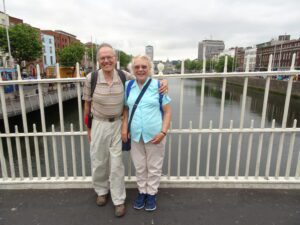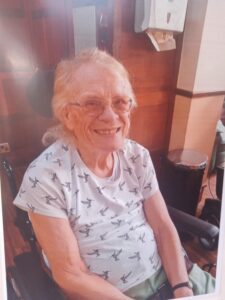Roy's story


My name is Roy, I am 74 years old and at the moment, I am living alone.
My wife is in a care home after suffering from a spinal stoke, despite the original diagnosis that she had Guillain-Barre syndrome.
I visit her regularly and generally supplement her wellbeing. This involves getting anything that she needs, taking her out (I have a wheelchair accessible vehicle) and supporting her in any other way.
My wife’s neurological condition has affected us immensely. It’s affecting her because of the disability she now suffers with, and affecting me because I now live alone and much of my time is taken up either visiting her or attending help sessions with her.
For over two years we lived with the fact that she had Guillain-Barre syndrome, a neurological condition where most people make a good recovery and regain at least some sort of mobility.
During the Covid lockdown, my wife was only having phone call appointments with the neurological department at the hospital, which is not ideal. At some stage they thought that it would useful for her to have an appointment with a neurologist at Addenbrooks, a hospital in Cambridge. At this same appointment, the specialist quickly concluded that she had suffered a spinal stroke and had not got GBS. He indicated that the paralyses were permanent although some physiotherapy would be helpful.
My wife fell ill with this condition just over five years ago and it is only just recently that she has been given a proper neurological rehabilitation assessment by the NHS. Although very late in the day, we hope that this does lead to some improvement in her condition.
We both hope that at some stage she may be able to return home but due to the fact that she cannot transfer, much work and adaption would have to be carried out to accommodate this.
I would like to think that I have adapted to this situation I’ve been placed in but I have not found it easy. I now find myself dealing with large sums of money, care home fees and, of course, doing all the jobs at home and getting meals for myself. I am kept very busy with various activities, some linked to my wife’s condition and others to do with my own interests.
I don’t know exactly what advice I could give to anyone else finding themselves in this situation.
The most important thing I would think is to find as much support as you can and seek advice from organisations such as the Brain & Spine Foundation.
The Brain & Spine Foundation has given me a great deal of support since I eventually found out about it following my wife’s re-diagnoses. I often join the carers peer support group Zoom sessions which do give emotional support. They have also been very helpful in giving me individual help and support.
With Linda’s spinal stroke re-diagnosis, I also found out about a local stroke support group, the TSSS.
This stands for ‘Tendring Stroke Support Services’ and it serves our local area. I initially attended the carers meetings where I was made aware of a new session being held near to us for stroke survivors. We now regularly attend these weekly meetings which provide great support with group physiotherapy sessions and some social interaction with other people attending.
I would advise anyone who cares to check local groups as they can be so helpful.
For a carer, I think you have to adapt physically and mentally for the change in your life. It is important to take time to relax and to include many things in your life that you enjoy and make you feel good.
Try and block out of your mind things that are no longer possible and think about some of the things that you are now doing and different people you are meeting as a result.